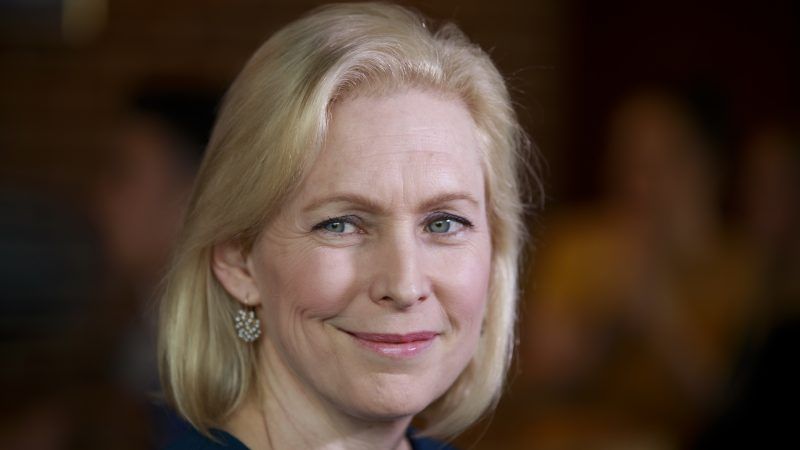Gillibrand Proposes Giving Every Voter $600 To Donate to Campaigns
The Democratic senator and 2020 presidential hopeful calls it her "Clean Elections Plan."

In her first major policy proposal of the 2020 presidential election, Sen. Kirsten Gillibrand (D–NY)—a long shot candidate for the Democratic nomination—is suggesting that every voter be given $600 to donate to federal election campaigns. Affectionately named "Democracy Dollars," she says the taxpayer-funded venture will clean up elections and "attack the corrupting influence of money at its core."
All eligible voters would qualify for the lump sum, which would then be doled out in $200 payments for each individual's House, Senate, and presidential candidate of choice.
"If you want to accomplish anything that the American people want us to accomplish — whether it's healthcare as a right, better public schools, better economy — you have to take on the greed and corruption that determine everything in Washington," she told NBC News.
Gillibrand says she'll finance her plan by eliminating a tax loophole for CEOs—which, between the various nominees, is starting to sound like a cure-all for society's ills. Those making more than $1 million or 25 times the median salary of their employees—whichever is less—would finance Democracy Dollars with $60 billion in additional taxes over 10 years, according to Gillibrand's plan.
The Democratic senator references Seattle as her inspiration, whose Democracy Voucher program allots $100 to every eligible voter to donate in each municipal election. Yet the results of the program's pilot attempt in 2017 were that everything stayed pretty much the same: Only 3.3 percent of recipients participated, and the winning slate was dominated by incumbents and those backed by the establishment.
"When you say that we are going to allow public funds to go to candidates, voters are going to give the vouchers to people they are familiar with, they know, that they are comfortable with, and those are going to tend to be incumbents," Ethan Blevins, an attorney at the Pacific Legal Foundation, told Reason following the election. That's a far cry from Seattle's mission statement to elevate "more candidates, including women, young people and people of color, to run viable campaigns against big money candidates."
"By leveling the playing field of who's powering federal campaigns, my plan amplifies the voices of Americans who haven't been heard for too long — young people, women, and people of color," Gillibrand's plan reads.
Only candidates who refuse to accept individual contributions over $200 would be allowed to cash in on Democracy Dollars. The current limit is $2,800, which candidates could still opt to accept if they forego the publicly funded vouchers. While it seems unlikely that most candidates would relinquish that opportunity, Gillibrand tells NBC that she expects they'll do that, "because the potential of how much you could raise in this system is exponentially higher."
That wouldn't stop those same candidates from seeking big money support, though: Adherents to Democracy Dollars could still solicit help from super PACs, which Gillibrand's plan does not address. Although super PACs are barred from donating directly to a particular individual or party, they often spend enormous wads of cash to indirectly fund a candidate, often via advertising blitzes. They are under no spending limit when doing so.
But perhaps the more pressing issue here is a First Amendment one, as a small group of taxpayers would be forced to fund candidates, some of whom they would inevitably object to. Yet whether they disagree with them is almost beside the point: Gillibrand's plan is a form of compelled speech.


Show Comments (75)